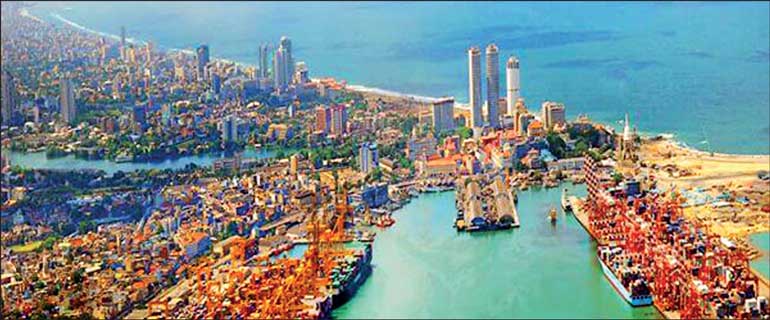Thursday Feb 19, 2026
Thursday Feb 19, 2026
Friday, 29 December 2023 00:25 - - {{hitsCtrl.values.hits}}

 The Sri Lankan economy currently grapples with the significant challenges presented by a complex financial situation unfolding in unprecedented ways. As the country tackles the intricacies of this economic turmoil to overcome fiscal obstacles, there is a prevailing sense of concern among the populace. Against this backdrop, the nation contends with politically motivated decision-making that bears the marks of a presidential election at the end of 2024.
The Sri Lankan economy currently grapples with the significant challenges presented by a complex financial situation unfolding in unprecedented ways. As the country tackles the intricacies of this economic turmoil to overcome fiscal obstacles, there is a prevailing sense of concern among the populace. Against this backdrop, the nation contends with politically motivated decision-making that bears the marks of a presidential election at the end of 2024.
Despite these existing realities, we remain optimistic about the rising potential through collective efforts and shared objectives driven by the nation’s private sector, aiming to revitalise the economy. In the present circumstances, positive indicators emerge as macroeconomic policy reforms start showing concrete outcomes, signalling a promising phase of stabilisation in Sri Lanka’s economic landscape. Nonetheless, the path to recovery and inclusive growth relies on maintaining the ongoing momentum of these reforms.
Looking at the recent upgrade of Sri Lanka’s local currency rating from selective default (SD) to CCC+/C by S&P Global Ratings, there is a reflection of a more optimistic view of the country’s solvency. This upgrade follows the finalisation of a domestic debt restructure, including collaboration with superannuation funds (EPF/ETF) and the Central Bank. (https://www.fitchratings.com/research/sovereigns/fitch-upgrades-sri-lanka-long-term-local-currency-idr-to-ccc-28-09-2023)
The completion of the first IMF review under the 48-month Extended Fund Facility marks a significant milestone, unlocking access to SDR 254 million (about $ 337 million) to support the country’s economic policies and reforms. Notably, Sri Lanka’s performance under the program has been deemed satisfactory, with the majority of performance criteria and indicative targets met by the end of June.
The publication of the Governance Diagnostic Report showcases a pioneering step, positioning Sri Lanka as the first country in Asia to undergo this IMF exercise. The commendable progress made by the authorities in restoring debt sustainability, raising revenue, and ensuring financial stability reflects a positive trajectory. Moving forward, a strong commitment to improving governance and protecting the welfare of the vulnerable will be crucial, laying the foundation for a resilient and prosperous economic future.
Examining Sri Lanka’s net general government debt, which currently exceeds 100% of GDP and is projected to persist until at least 2028, there are challenges ahead. Addressing concerns about long-term sustainability, potential positive shifts can be driven by factors such as nominal GDP growth, successful fiscal consolidation, increased revenue generation, current interest rates, and the positive impacts of future restructuring efforts. By navigating these aspects effectively, Sri Lanka has the potential to enhance its fiscal outlook and achieve more favourable outcomes in the coming years. (https://www.fitchratings.com/research/sovereigns/fitch-upgrades-sri-lanka-long-term-local-currency-idr-to-ccc-28-09-2023)
Ambitious targets
It’s noteworthy that Sri Lanka’s Budget for 2024 presents ambitious targets, though they pose challenges, particularly with the projected wider fiscal deficit of 9.1% of GDP. The Government’s focus on achieving a primary surplus, excluding bank recapitalisation, aligns with the IMF’s projections. However, the expenditure target of 22.2% of GDP exceeds the IMF’s envisioned 19.7%. While this discrepancy may raise questions, it also reflects a commitment to ambitious goals, and successful implementation could enhance the Budget’s long-term viability and effectiveness. (https://island.lk/sri-lankas-ambitious-budget-agenda-faces-high-implementation-risks-fitch-ratings/)
Fitch Ratings has already expressed concerns about the Government’s plan to reach its revenue target by 2024. Sri Lanka has a history of not meeting fiscal goals, with revenue collection falling short by 29% in the first nine months of 2023. Recently, the Government has planned a revenue increase of nearly 45% in 2024, with a confirmed 3-percentage-point rise in the value-added tax to 18%.
We believe as far as tax revenue is concerned, widening the tax net or the number of taxpayers in the country is more critical than raising the percentage values. Only as little as 2.6% of Sri Lanka’s total workforce of 4.64 million is subjected to the PAYE income tax. Nearly half of the labour force receives less than Rs. 30,000 monthly salary, while 3.91 million families, out of 5.8 million families, are seeking State assistance to continue their livelihoods. In 2021, there were about 105,000 registered companies, and 60,721 had income tax files, from which 82% of the corporate income taxes were paid by 342 companies. (https://economynext.com/sri-lanka-only-has-137-persons-who-paid-income-taxes-of-rs5mn-or-more-legislator-100108/#:~:text=Sri%20Lanka%20in%202021%20had,were%20paid%20by%20342%20companies)
What baffles us mostly is the number of tax files reported by the Inland Revenue which is recorded to be only 500,000 as per the Commissioner Association Inland Revenue department. (https://www.newsfirst.lk/2023/07/27/tott-only-500-000-tax-files-in-sri-lanka-president-commissioner-association-27-07-2023/). If the recorded number of tax files is only 500,000 out of the 5.8 million families in Sri Lanka, we must ask the question of what has happened to the rest of the taxpayers.
Several businesses in Sri Lanka, whether small, medium, or large, conduct their transactions mainly through cash. Despite how much they earn, there can be several loopholes they can harness for tax evasion. Even though it is apparent in many ways, there is little to no step taken forward to curb the issue owing to political gains or the mass displeasures that could arise curbing the future of many political affiliates in the decision-making process.
Concurrently, the growing wealth gap between the affluent and less privileged segments of the population is reaching alarming levels, compelling numerous skilled professionals to seek better opportunities abroad.
Government’s inability to overhaul unprofitable state-owned enterprises
It’s not just the taxation system; the Government’s inability to overhaul unprofitable state-owned enterprises (SOEs) adds to the discontent. The weight of these financially struggling entities falls disproportionately on a limited number of taxpayers, causing widespread chaos that ripples through the entire system. This, in turn, has a cascading impact on the economy and Sri Lankan society. An aspect often overlooked by many governing parties owing to their political future. Given that a significant portion of those affected by these restructuring efforts comprises a substantial voter base and influential circles in the country, there appears to be a reluctance among decision-makers to take the necessary corrective actions.
One of the contributing factors for the IMF to provide the second tranche was the promise to reduce the commercial bank interest rates to single digits, which is yet to be done. Even though the President and the CBSL have requested the above, several parties have been insensitive about the situation and requests. As COYLE, we emphasise the importance of expanding the tax potential net and then further tracking the registered yet inactive member mass. However, we can observe, that the Government is now distracted to a path more concerned with securing votes for the upcoming elections as opposed to the earlier economic revival path, which has diminished its momentum from the critical pace of decision-making on SOE restructuring.
This will bring us to COYLE’s point of view on how we can set further to solve the foreign currency deficit by adopting different and dynamic strategies. At COYLE, we believe Sri Lanka must look at foreign direct investments with changing State policy decisions to have a more attractive and investor-friendly outlook to attract numerous investors from booming industries. We urge the Parliamentary Select Committee on Ease of Doing Business to reactivate and pursue proactive steps towards ensuring FDIs are secure in the country without further delay.
(The writer is COYLE Chairman.)